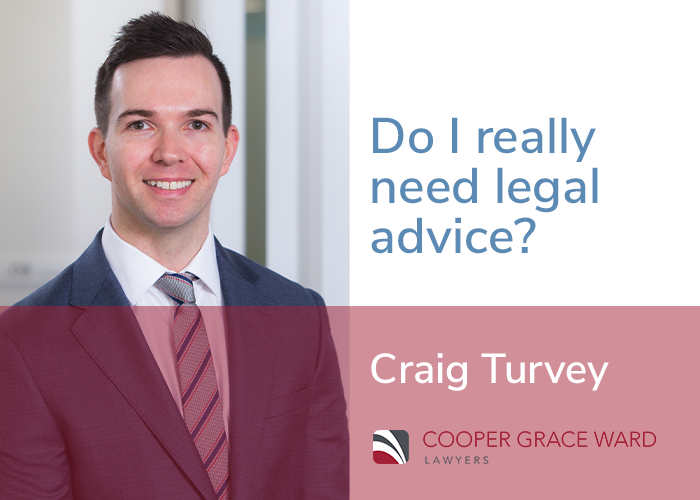In this week’s video, CGW senior associate Craig Turvey answers the question; do I really need legal advice?
VIDEO TRANSCRIPT
Hi, my name is Craig Turvey and I’m a senior associate in the family law workgroup at Cooper Grace Ward.
Today, I wanted to talk to you about a common issue that we have in family law world, which is where clients will come to us with a deal they’ve reached with another party, they won’t have had legal advice beforehand and they’ll just say to us oh, can you just document this for us, just draw it up, I’m happy with what we’ve agreed, it’s all good. Which is fine, until you go through the nitty gritty of what they’ve presented to you and you go into it in a bit of detail and you think, have you thought about this? You might have a greater entitlement than what you’ve accepted, are you happy with that? You really have to sort of push those legal questions that they haven’t obtained any advice about beforehand and often that can detonate a deal that two people have reached between them.
So, I wanted to talk to you about the importance of getting legal advice initially and how if you accept a deal with someone and then renege on it, what the consequences of that may be.
So, in terms of obtaining advice, it’s one of the most important things that people should do and they should do that upfront. Clients will often come to us and say, oh my ex and I we talked about it, we don’t really want to see a lawyer to get advice and this is just what we’ve agreed as though that’s a good thing. It should be something where people when they separate obtain advice about property settlements, if there’s spousal maintenance, obviously, if you have children, what parenting arrangements might be appropriate and what a Court might order. Those are the sorts of things that both parties should obtain advice about and it shouldn’t be seen as a bad thing. It doesn’t have to be an episode of Suits like, it doesn’t have to be a big contested Court event where people fight, it can be just you obtain advice independently, you then know what you’re both entitled to and then you can negotiate directly in a sensible way and reach an agreement, rather than just sort of reaching an agreement in the dark without knowing what you’re likely to get and then having to correct that at a later stage, when you find out that you haven’t addressed all the issues, or you might have a much higher entitlement than you thought you did.
So, that brings me to my second point, which is that you really shouldn’t tell someone you have a deal or that you accept their proposal that you’ve got some sort of final agreement, until you’re pretty confident that you do and you’ve attained advice and you’re happy with where you are. You have to think about it from the other person’s perspective, if you accept a deal and then renege on it, that has consequences in terms of your relationship with them directly and in terms of their future behaviour towards you in terms of negotiating and those types of things. So, if you renege on a deal that you have with someone, they’re not usually they’re not likely to be happy about that. So, that might mean that they’re therefore more difficult to negotiate with in the future. If you’ve accepted a deal, a property settlement deal and there’s lots of different corporate aspects to it, they may have tried to already enact the deal by transferring certain things, moving money across, doing things to comply with what they thought your agreement was before you’re reneged on it. So, sometimes it can be impossible or difficult to wind things back. Or people just don’t want to do it once they think they’ve got a deal to then have to go back and redo things.
So, I would just encourage people to obtain advice at an early stage. Don’t feel that you have to rush into accepting in a deal. You’re better off getting the advice, considering what your options are, making an informed decision and then once you’re happy with all of that sure, negotiate and reach a deal with the other person.
So, if you have any questions about how to negotiate or what your entitlements might be, feel free to contact me or one of the other family lawyers at Cooper Grace Ward.





